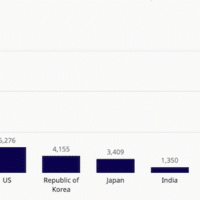-
China dominates AI innovation: 74.7% of Global GenAI patents
Outpacing the U.S. 6 to 1.
-
What’s behind the rise of AI powerhouse Nvidia?
Nvidia’s brief streak as the world’s highest valued company in the last several weeks has catapulted the chipset manufacturer into the headlines all over the world. A year ago, Nvidia was valued at just under $1 trillion. Nine months later, it blew past the $2 trillion mark, and just 30 days after that, for a moment in June 2024 Nvidia peaked at $3.3 trillion.
-
AI and the digital scramble for Africa
We are told that Artificial intelligence (AI) has the potential to be a powerful tool for advancing democratic concerns and human rights across Africa. Yet, there are also early indicators that AI could undermine democratic institutions and processes, especially if these technologies prioritise colonial-capitalist development trajectories. Scott Timcke looks at some of the issues at stake.
-
Julian Assange–from Belmarsh to freedom at last
At long last the WikiLeaks founder is free. For all those who care about freedom of speech it’s time to celebrate, writes TIM DAWSON of the International Federation of Journalists.
-
A cautionary tale for open science: AlphaFold3
A NEW AI (Artificial Intelligence) model, AlphaFold3, has excited the scientific community.
-
How U.S. Big Tech supports Israel’s AI-powered genocide and apartheid
As an extension of U.S. imperial power, U.S. tech corporations are eager to support Israeli atrocities.
-
Mitt Romney says Congress supports banning TikTok for Israel
Antony Blinken says Israel is losing the PR war because of social media.
-
AI chatbots: Hype meets reality
The chatbot revolution began in 2022 with OpenAI’s introduction of ChatGPT.
-
AI countergovernance
In the last year, the rapid uptake of generative artificial intelligence (AI) systems such as ChatGPT, Dall-E, and Stable Diffusion has led to countless public discussions about the ethics and regulation of AI.
-
Activist Ola Bini sentenced to one year in prison after Ecuadorian court overturns acquittal
Arrested on the same day as his friend Julian Assange in 2019, software developer and activist Ola Bini has faced years of persecution in Ecuador. Despite being declared innocent in 2023, an appeals court has now convicted him for “Attempted Non-Consensual Access to a Computer System”.
-
U.S. workers forced to bail out Intel, a top 100 company
President Biden announced the grant, part of the massive $280 billion CHIPS Act, on March 20 in Arizona.
-
Meet the AI-Censored? Naked Capitalism
Google provides an early, scary test case for mechanized suppression by threatening a popular economics site with demonetization.
-
Assange in plea deal talks
The report in The Wall Street Journal makes public what Consortium News had learned off the record, namely that the U.S. is engaging Julian Assange’s lawyers about a deal that could set the imprisoned publisher free.
-
Why are U.S. lawmakers dead set on banning TikTok?
Past efforts to ban the enormously popular app in the United States have failed. Recent success could be linked to the popularity of the Palestine solidarity movement.
-
House votes against TikTok—and for more Cold War
A bipartisan effort to effectively ban the social media network TikTok in the United States has taken a great leap forward.
-
Internet ‘gardeners’ resist the communication blackout of Gaza
Since October, Gaza has been an internet black hole. But the Italian NGO ACS has helped build a network of e-SIM internet hotspots known as the Gazaweb.
-
ACLU slams House for latest plan to ban TikTok and stifle free speech
This bill, which was introduced by Reps. Mike Gallagher (R-Wis.) and Rep. Raja Krishnamoorthi (D-Ill.), would violate the First Amendment rights of hundreds of millions of Americans who use the app to communicate and express themselves daily.
-
“Emergent” AI behavior and human destiny
What happens when killer robots start communicating with each other?
-
Canada imposes catch-all definition of “espionage” as part of bellicose anti-China furor
In a decision with far-reaching implications for democratic rights, a Federal Court has endorsed the Canadian government’s imposition of a sweeping new definition of espionage.
-
Chip Wars: Breaking the siege
While the sanctions regime has hit Chinese companies, especially Huawei, hard and exposed weak links in China’s chip supply chain, the last year has seen significant progress by Chinese companies.





![[AI 뉴스] Google Deepmind - 구글 딥마인드 AI, 해결되지 않은 수학 문제 해결](https://mronline.org/wp-content/uploads/2024/06/R1280x0-2548174833-200x200.png)
![A counter-protester holding an Israeli flag walks into the car park near a protest at Google Cloud offices in Sunnyvale, California on April 16, 2024 [File: Reuters/Nathan Frandino]](https://mronline.org/wp-content/uploads/2024/05/2024-04-16T223807Z_912529887_RC2U77A7NX0N_RTRMADP_3_ISRAEL-PALESTINIANS-USA-GOOGLE-PROTEST-1715515873jpg-200x200.webp)












![Prime Minister Trudeau and US President Biden, during the latter’s March 2023, visit to Canada. In response to pressure from the US, for three-quarters of a century the Canadian ruling class’ principal strategic ally, the Trudeau government has adopted an ever more bellicose stance against Beijing. [AP Photo/Andrew Harnik]](https://mronline.org/wp-content/uploads/2024/01/3a34548d72153ca09711a0a6c868897804dc6bc7-200x200.jpg)